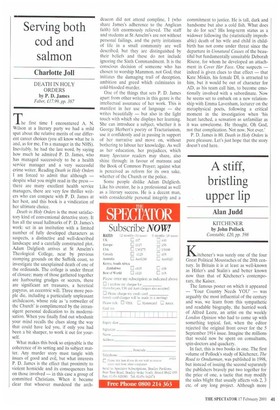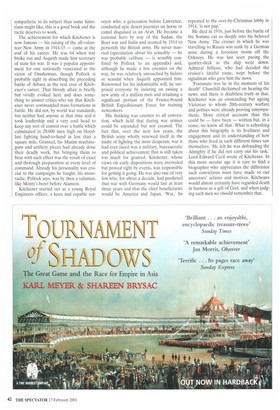A stiff, bristling upper lip
Alan Judd
KITCHENER by John Pollock Constable, £20, pp. 598 Kitchener's was surely one of the four Great Political Moustaches of the 20th century. In Britain it is at least as well-known as Hitler's and Stalin's and better known now than that of Kitchener's contemporary, the Kaiser.
The famous poster on which it appeared — 'Your Country Needs YOU' — was arguably the most influential of the century and was, we learn from this sympathetic and readable biography, the hurried work of Alfred Leete, an artist on the weekly London Opinion who had to come up with something topical, fast, when the editor rejected the original front cover for the 5 September 1914 issue. Imagine the millions that would now be spent on consultants, spin-doctors and quackery.
In fact, this is two books in one. The first volume of Pollock's study of Kitchener, The Road to Omdurman, was published in 1998, but instead of issuing the second separately the publishers bravely put two together for the price of one, a tactic that may modify the sales blight that usually affects vols 2, 3 etc. of any long project. Although more
sympathetic to its subject than some historians might like, this is a good book and the tactic deserves to work.
The achievement for which Kitchener is now famous — his raising of the all-volunteer New Army in 1914-15 — came at the end of his career. He was 64 when war broke out and Asquith made him secretary of state for war. It was a popular appointment for one nationally venerated as the victor of Omdurman, though Pollock is probably right in describing the preceding battle of Atbara as the real crux of Kitchener's career. That bloody affair is briefly but vividly evoked here and does something to answer critics who say that Kitchener never commanded mass formations in battle. He did not, by world war standards, but neither had anyone at that time and it took leadership and a very cool head to keep any sort of control over a battle which culminated in 20,000 men high on bloodlust fighting hand-to-hand in less than a square mile. Granted, his Maxim machineguns and artillery pieces had already done their deadly work, but bringing them to bear with such effect was the result of exact and thorough preparation at every level of command. Already his personality was crucial to the campaigns he fought; his moustache, Pollock says, was by then a talisman, like Monty's beret before Alamein.
Kitchener started out as a young Royal Engineers officer, a keen and capable sur veyor who, a generation before Lawrence, conducted epic desert journeys on horse or camel disguised as an Arab. He became a national hero by way of the Sudan, the Boer war and India and seemed by 1914 to personify the British army. He never married (speculation about his sexuality — he was probably celibate — is sensibly confined by Pollock to an appendix) and, although he made a few enemies on the way, he was relatively untouched by failure or scandal when Asquith appointed him. Renowned for his indomitable will, he surprised everyone by insisting on raising a new army of a million men and retaining a significant portion of the France-bound British Expeditionary Force for training newcomers.
His thinking was counter to all convention, which held that during war armies could be expanded but not created. The fact that, over the next few years, the British army wholly renewed itself in the midst of fighting the most desperate war it had ever faced was a military, bureaucratic and political achievement that is still taken too much for granted. Kitchener, whose views on early dispositions were overruled but proved right by events, was responsible for getting it going. He was also one of very few who, for about a decade, had predicted that war with Germany would last at least three years and that the chief beneficiaries would be America and Japan. 'War,' he repeated to the over-by-Christmas lobby in 1914, 'is not pap.'
He died in 1916, just before the battle of the Somme cut so deeply into his beloved New Army. The cruiser in which he was travelling to Russia was sunk by a German mine during a ferocious storm off the Orkneys. He was last seen pacing the quarter-deck as the ship went down. Admiral Jellicoe, who had decided the cruiser's fateful route, wept before the signalman who gave him the news.
'Fortunate was he in the moment of his death!' Churchill declaimed on hearing the news, and there is doubtless truth in that. Kitchener was an outstanding but ageing Victorian to whom 20th-century warfare and politics were already proving unsympathetic. More critical accounts than this could be — have been — written but, in a sense, we know all that. What is refreshing about this biography is its liveliness and engagement and its understanding of how those who lived in such different times saw themselves. 'He felt he was defrauding the Almighty if he did not carry out his task,' Lord Edward Cecil wrote of Kitchener. In this more secular age it is rare to find a biographer who appreciates the difference such convictions must have made to our ancestors' actions and motives. Kitchener would almost certainly have regarded death in harness as a gift of God, and when judging such men we should remember that.



































































 Previous page
Previous page